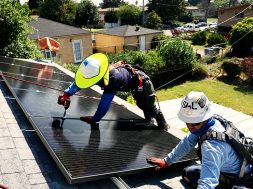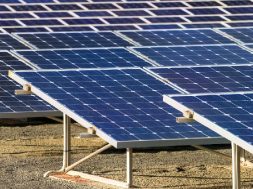
Thane residents switch to ‘smart’ sanitation at solar powered community toilet
Using community toilets is no longer a dirty business for over 200 poor families in Sathewadi, Thane (West). The toilet that they use is powered by solar energy, has 20 clean cubicles and uninterrupted water supply. Also, it is only accessible to those who have a smart card. The community sanitation complex, as the building is called, stands in the shadow of Dyanasadhana College and can easily be mistaken for a hospital had it not been for the board at the entrance. The three-storey complex has two cubicles for the specially-abled on the ground floor — one each for men and women. It has 11 cubicles for men, five for women, two for children, two bathrooms and a store room on the second and third storeys.“You cannot enter the building unless you have a smart card,” said Shubhangi Ashok Shirde, a resident of Sathewadi and member of the group that maintains the complex. “This makes the complex secure as unknown people cannot enter it while we use it,” added the 40-year-old, who chooses to use this toilet even though she has one at home.
Nilesh Karkare from Habitat for Humanity, the NGO that funded the toilet, said, “We introduced smart cards as it made the complex safer and helped us gather data on the users. We had manufactured 1,000 smart cards, of which 850 are in circulation.” Residents have to submit copies of their ration, aadhaar and voter identification cards to get a smart card. “We do not charge any money for the cards but residents have to pay Rs11 per month towards maintenance charges,” said Karkare.Residents will soon be able to use these cards to recharge their phones, get cable connections, book rail tickets and get check-ups. The NGO is planning to award five credit points on each use of the card, which the residents can avail to get a free medical check-up at KJ Somaiya Hospital in Sion. Karkare added that the NGO wanted to limit the use of the complex to 1,000 people only. “Around 200 families in the area use it and we would not want more than 1,000 people as maintenance would become difficult,” he said.
Currently, the complex is managed by a residents’ self-help group. Sunanda Jhadav, 48, who helps in cleaning the toilet, said, “Not just the toilet, Sunvest also trained us to maintain the solar panels. We clean it two to three times a week.”The complex has four CCTV cameras, one each at the entrance, on the staircase, in front of the women’s section and in the battery room. Solar panels installed on the rooftop supplies most of the power that the complex needs. Sishir Garemella, CEO of Sunvest, helped in setting up the solar panels. He said, “It is a hybrid system that has a storage capacity of 1.5 kilowatt with battery backup and can also run on the electricity grid as backup.” Apart from being self-sufficient when it comes to power, the building also has motion-sensing lights that switch on automatically when people enter it and turns off seconds after people leave it, thus saving power. Constructed after demolishing a public toilet, residents said that they were happy with the ‘community sanitation complex’. “Everything is so clean here. I even get my relatives to use it,” said Shirde.













